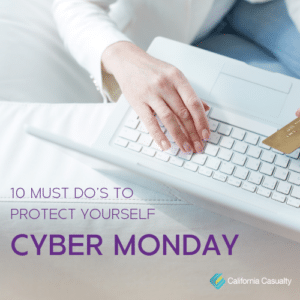
by California Casualty | Homeowners Insurance Info |
Having a working smoke detector can reduce your risk of dying in a home fire by half. That’s why the National Fire Protection Association asks us all to be alert this fall- late fall and winter are when the number of home fires spikes.
While we depend on firefighters to put out fires and save lives, we all need to do more to protect our families until they can get there.
Here’s what you can do to make your family and home safer:
- Install smoke alarms on every level of your home and in all bedrooms
- Test smoke alarms monthly and replace batteries once a year (normally the Sunday when Daylight Saving ends)
- Replace smoke detectors every ten years
- Practice fire drills and evacuations
Smoke alarms can cost as little as $15 for those that use batteries, hardwired models will cost more. Some fire departments offer low-cost or free smoke detectors for families with financial hardships.
There should be one placed in every bedroom, outside sleeping areas and on every floor of a home.
Here are some important things to remember about home fires:
- Cooking is the leading cause of home fires, followed by heating equipment
- Smoking materials are the leading cause of home fire deaths
- Only one-third of Americans have developed and practiced a home fire escape plan
These safety tips can prevent a fire at your home:
- Never leave food unattended on the stove or in the oven
- Avoid using candles and if you do make sure they are away from flammable materials and extinguished when you leave the room
- Don’t smoke in bed
- Have your furnace inspected every year by a heating professional
- Keep portable heaters three feet away from flammable materials
- Don’t use frayed cords and don’t overload outlets
This article is furnished by California Casualty, providing auto and home insurance to educators, law enforcement officers, firefighters, and nurses. Get a quote at 1.866.704.8614 or www.calcas.com.

by California Casualty | Safety |
‘Tis the season of joy, shopping, and unfortunately cyber thievery. While millions of Americans will be looking online for Cyber Monday bargains, crooks will be trying to steal their money, personal information, and identity. It’s estimated that a person’s identity is stolen online every three seconds, in the United States.
So, how do you avoid the “bad Santa’s” lurking on the internet? To help keep this the most wonderful time of year, we’ve assembled these 10 tips from the Better Business Bureau and our identity theft prevention partner, CyberScout, to add to your holiday list:
- Only shop on secure sites – look for “https” in the URL and a locked padlock symbol and avoid doing so on public WiFi
- Install the latest security software to block the crooks
- Never give personal information, especially social security numbers or passwords
- Use a credit card, not a debit card, for payment (you might consider purchasing a prepaid gift card to use for online shopping)
- Click out of suspicious links immediately (AVG has a free LinkScanner that checks sites legitimacy for you)
- Beware of Santa scammers who promise to send a letter to your child; often they are collecting personal data for ID theft
- Don’t buy used electronics; many are preloaded with malware that can steal personal information and passwords
- Avoid downloading online coupons sent to your email or from websites you are not sure of
- Use unique passwords for every site
- Don’t buy that cute puppy via the Internet – scammers use the holidays to take money for puppies that don’t exist, often using the ruse to get banking and personal information
The quicker you catch a possible breach, the better. Credit experts like CyberScout advise consumers to check their credit card and bank statements weekly, request a receipt for any purchase you make and run a free credit check annually.
California Casualty wants to make sure your identity stays safe from online Grinches; every auto and home/renters insurance policy comes with Free ID theft protection and resolution services from CyberScout. Make sure to protect your property and identity this holiday, call a California Casualty advisor today at 1.800.800.9410, or visit www.calcas.com/identity-theft.
For more information visit:
https://bit.ly/2OCvuM4
https://bit.ly/2OctRpu
https://bit.ly/2XNR7NL
This article furnished by California Casualty, providing auto and home insurance to educators, law enforcement officers, firefighters, and nurses. Get a quote at 1.800.800.9410 or www.calcas.com.

by California Casualty | Educators |
Having a good parent-teacher relationship is vital for helping the year go smoothly, especially in the middle of the school year. Here are eight things teachers wish you knew and would tell parents if they could, but usually don’t.
- Attending meetings and conferences helps both of us.
There could be new policies and procedures to explain, or just a chance to talk about what a teacher is seeing in the classroom compared to the child at home. If you miss out you might miss important information, or what sort of homework/schedule to expect.
- If your kid is having a bad morning or week, let me know.
You don’t have to go into detail, but it can make it much easier if your child’s teacher knows your little one might be feeling a little bit off.
- I can tell when your child isn’t getting enough sleep.
Educators are noticing that kids just don’t have bedtimes like they used to. Letting your child stay up too late watching TV or playing on the computer can have an effect on their learning and on the classroom.
- I buy school supplies with my own money for a reason.
Yes, it’s a sad truth; many schools just don’t provide teachers with the budgets or supplies they need for their classrooms. Take care not to lose that sturdy folder (filled with helpful memos) that the teacher sends home with your kid every day. Also, if he or she asks you to chip in for supplies, do what you can.
- If you have young children, don’t trust them to tell you everything that happens at school.
Check their backpacks for homework assignments, permission slips or notes home. Take advantage of parent-teacher conferences to get some undivided time with the teacher.
- When your child gets older, it doesn’t mean you can start being less involved.
In high school and middle school, you might be tempted to ease off the gas when it comes to checking in on what your child does at school. But teachers report that setting a positive example, and taking interest in your kid’s education, is still critical in the later years.
- I work on the weekends.
If you still believe that teaching is a part-time job, educators would like to remind you that they regularly put in extra-long days and catch-up on classroom prep on the weekend. teachers wish you knew
- You can ask me anything.
If there’s one thing teachers want from their students’ parents, it’s more communication. Teachers view education as a collaborative process between them and the parent. So, if you have a question or concern, definitely speak up! The clearer you are with each other, the easier and more productive the year will be.
Like every career today, educating children is ever-evolving. You can find all kinds of great classroom resources and tips at our blog, https://mycalcas.com/category/auto-insurance-for-teachers/ or at https://mycalcas.com/category/teachers/.
This article is furnished by California Casualty, providing auto and home insurance to educators, law enforcement officers, firefighters, and nurses. Get a quote at 1.866.704.8614 or www.calcas.com.

by California Casualty | Homeowners Insurance Info |
You may believe that everything in or around your home is covered by your homeowner’s policy, but that may not be the case. Sure home insurance will help you rebuild if there’s a fire, tornado. or a tree falls onto your home, but are you aware of what your insurance doesn’t cover?
These are the 5 most common things not covered by most home insurance policies:
- Earthquake and Land Movement
- As landslides and earthquakes have become more common in many states, many people are surprised to learn that earthquake or land movement damage is not covered by standard homeowners insurance. You need to purchase separate earthquake and landslide insurance protection.
- Floods
- Multiple surveys have found a majority of homeowners and renters thought their property insurance protected them from flooding; it doesn’t. If you live in an area prone to flooding, consider purchasing flood insurance, provided primarily by the federal government. Keep in mind there is a 30 day waiting period before any flood policy can go into effect.
- Sewer Backups
- The sludge from sewer backup can do serious damage and make your home unsafe until it’s properly cleaned up, but it’s not covered under most homeowner insurance policies. Your insurance company can provide a special endorsement to cover sewer or sump pump backups. What you may not know is that homeowners are responsible for the maintenance of sewer and water lines through their property up to the sewer main, and many cities and utility departments will deny responsibility for most sewer incidents.
- Maintenance Issues
- Insurance companies can dispute payment of damage or injuries if you fail to repair a broken step or other obvious hazards, or for mechanical breakdown of an appliance. In most cases, you will also need a special rider to cover food that might be lost due to a power outage or failure of a freezer or refrigerator.
- Expensive Jewelry, Fine Art, Firearms, Musical Instruments, Furs, and Collectibles
- Many people learn after a fire or tornado that their precious items only had minimal coverage. You’ll need special scheduled personal property coverage, often called a “floater,” to make sure they are protected for their full value. In fact, 60 percent of homeowners have not documented all the valuable things they own. What does that mean to you? Completing a home inventory can speed up your claim and help you determine how much coverage you need. Download our easy Home Maintenance Checklist, and stay prepared for a disaster before it’s too late.
For more information on what home insurance does cover, visit our website at www.mycalcas.com/home-insurance
Related Articles:
Flood Insurance is a Necessity Everyone Should Consider
Complete a Home Inventory
Know Your Insurance: Climate Change Protection
This article is furnished by California Casualty, providing auto and home insurance to educators, law enforcement officers, firefighters, and nurses. Get a quote at 1.866.704.8614 or www.calcas.com.
by California Casualty | Firefighters, Video |
day with firefighters

ARVE error: Invalid URL url
A Day With Firefighters – Journey’s Experience
Join 8-year old Journey for a special behind the scenes look in to a day in the life of a Firefighter. Watch as he learns why fire stations have sleeping quarters. See what happens when a call comes in – even at 2 in the morning. Plus, find out how heavy fire gear really is.
As a special bonus, check out Journey demonstrate his dynamic STOP, DROP and ROLL moves!
Be sure to check out the other videos in our Heroes series. Or check out California Casualty’s YouTube Channel.
We’d like to extend an extra special thanks to the Firefighters and Police Officers who took the time to participate in our Heroes Video Series. It was a privilege to experience a day in your lives through the eyes of Giselle, Jayden and Journey! We appreciate your dedication and all you do to strengthen and enhance the quality of life in American communities.
The Heroes Video Series was filmed and produced by Wide Awake Films.
If you’re not already following California Casualty, you can find us on Facebook, Instagram, Twitter, Pinterest, YouTube and LinkedIn.
At California Casualty, our mission is to provide trusted, personalized auto and home insurance protection. exclusively for educators, law enforcement, nurses and firefighters—those who protect, strengthen and enhance the quality of life in American communities.




